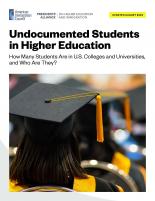- Fact Sheet
Undocumented College Students
How Many Students Are in U.S. Colleges and Universities, and Who Are They?
Published
An analysis of the 2021 American Community Survey finds that more than 408,000 undocumented students are enrolled in U.S. colleges and universities, comprising 1.9% of all college students in the country. This estimate represents a decrease of 4.2% from 2019, when 427,000 undocumented students were enrolled.
The drop likely reflects overall enrollment decline due to the pandemic and economic pressures, as well as factors that specifically impact undocumented individuals, such as the continued legal challenges to DACA. The number of students with DACA or who are DACA-eligible also continue to decline, from 182,000 in 2019 to 141,000 in 2021, making up only one-third of undocumented students and 0.7% of all college students.
One of the primary factors contributing to the smaller population of DACA or DACA-eligible students is the program’s lack of updates to include individuals who arrived in the U.S. after 2007, which is the specified eligibility date. Consequently, if someone arrived in the U.S. at the age of four in 2008, they would be of college age but not eligible for DACA.
While most undocumented students pursuing postsecondary education in the United States do not have DACA, the vast majority, accounting for three out of four undocumented students, did come to the U.S. at a young age. These students, commonly known as Dreamers, have grown up in American neighborhoods and attended American schools. The undocumented students who came as adults have lived in the U.S. for an average of eight years.
Undocumented students represent a heterogenous population in higher education, reflecting the broad range and overall diversity of first-generation immigrants in the United States. 46% of undocumented students are Hispanic, 27% are AAPI
(Asian American Pacific Islander), close to 14% are Black, and 10% are white. Undocumented students include immigrant youth and adults at public and private institutions of higher education.
Increasing undocumented students’ access to U.S. higher education would result in reduced high school dropout rates, increased college enrollment, higher student achievement, and greater economic contributions. Receiving a postsecondary credential or attending some college increases one’s earning potential, as college and university graduates earn higher incomes and experience lower unemployment rates.
In light of the economic contributions Dreamers already make, and the future talent and workforce potential represented by this student population, the new estimates underscore why Congress must pass legislation that offers Dreamers a permanent legislative fix, one that allows them to work and study without fear of deportation and creates a path to permanent residency and U.S. citizenship. The data also highlights the importance of lowering barriers to college and career access for these students.
While a growing number of states have extended tuition equity and licensure eligibility to some undocumented students, many states have not. To fully leverage the contributions of undocumented students, state legislatures should expand access to in-state tuition, state financial aid, occupational licensure, and driver’s licenses to their state’s undocumented students. These policies would strengthen their economic recovery efforts. In 2021, households led by undocumented individuals contributed $30.8 billion in total taxes, including $18.6 billion in federal income taxes and $12.2 billion in state and local taxes. In pursuing higher education and careers, undocumented students are helping drive our country’s future and economic competitiveness.
Help us fight for immigration justice!
The research is clear – immigrants are more likely to win their cases with a lawyer by their side. But very few can get attorneys.
Introducing the Immigration Justice Campaign Access Fund.
Your support sends attorneys, provides interpreters, and delivers justice.

Immigration Justice Campaign is an initiative of American Immigration Council and American Immigration Lawyers Association. The mission is to increase free legal services for immigrants navigating our complicated immigration system and leverage the voices and experiences of those most directly impacted by our country’s immigration policies to inform legal and advocacy strategies. We bring together a broad network of volunteers who provide legal assistance and advocate for due process for immigrants with a humane approach that includes universal legal representation and other community-based support for individuals during their immigration cases.

